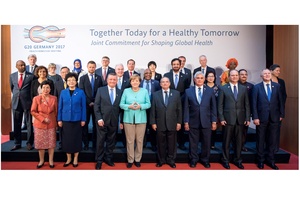Time for action on antimicrobial resistance and TB
First G20 Ministers of Health Meeting in Berlin recognizes TB as a priority under antimicrobial resistance.
22 May 2017 – Geneva, Switzerland – The world is
finally acknowledging the fact that TB claims the lives of 1.8
million people worldwide every year, and that 30% of all deaths
related to antimicrobial resistance (AMR) are caused by
drug-resistant TB globally. Ministers of health of the Group of
Twenty (G20) member countries
met for the first time
in Berlin, Germany on 19 and 20 May to discuss a coordinated
global response to global health challenges. The meeting paved
the way for the adoption of an
ambitious declaration on global health, that recognized TB and as a priority under AMR in
paragraphs 23, 30 and 31. In paragraph 32, the Stop TB Partnership was recognized as an
important partner, with the Declaration also welcoming the
decision by Member States to hold a WHO Ministerial Meeting on
TB in November 2017 and a UN High Level Meeting on TB in
2018.
Paragraph 32 reads: We recognise drug-resistant tuberculosis
as an important threat and therefore commit to address
tuberculosis within interventions for AMR. We acknowledge the
need to develop and promote access to new drugs, diagnostics
and vaccines to tackle drug-resistant tuberculosis consistent
with the WHO End TB Strategy. We recognize the importance of
other relevant initiatives and plans, such as the STOP TB
Partnership. We welcome the decision by Member States to hold
a United Nations High Level Meeting on Tuberculosis in 2018
and the WHO Ministerial Conference on Ending TB in the
Sustainable Development Era to be held in Moscow in November
2017.
On Sunday 21 May, in line with the adoption of the Declaration
and on the eve of the 70th World Health Assembly, the
Stop TB Partnership and Unitaid organized a high-level event
which focused on tackling AMR through innovation. Unitaid
launched
a new Call for Proposals with the aim of attracting smart ideas
to accelerate access to innovative treatment regimens and
diagnostics for tackling multidrug-resistant TB (MDR-TB).
Existing treatments for MDR-TB are long, toxic, with often
severe side effects, such as acute psychosis and deafness.
“Given the lingering threat of MDR-TB, we need to develop
shorter, simpler, less toxic treatments to effectively tackle
it. Unitaid is already investing US$ 60 million to speed up
access to new drugs and test their efficacy in resource-limited
settings.” said Lelio Marmora, Unitaid Executive
Director.
Recently, the World Health Organization (WHO) recommended a
shorter regimen for MDR-TB treatment, lasting 9 to 12 months,
with 4 to 6 months of injectable drugs. Patients not eligible
for the shorter regimen continue to require 18 to 24 months of
treatment, including 8 months of injectable drugs. Currently,
the range of treatment options fragments the market for
drug-resistant TB, reducing the commercial incentive for
innovation and development.
Under this Call, Unitaid aims to speed up the development and
adoption of new treatment regimens for MDR-TB linked to simpler
and faster TB testing, address market challenges and create the
evidence needed to inform WHO guidelines.
“The current available medicines for MDR-TB are a
challenge, in any ways you look at it: terrifying side
effects including irreversible hearing loss and depression, huge
costs – financial and human suffering and death.
Therefore, none of us should spare any efforts to ensure that we
have the shortest, most efficient and affordable treatment
and to make it accessible to all. Drug-resistant TB must be
fought with the right tools and we just don’t have them
now. Pushing the research and development (R&D) TB agenda
together with the AMR conversation gives me a lot of hope”
said Dr Lucica Ditiu, Executive Director of the Stop TB
Partnership.
The G20 Health Ministers underscored the need to
“reinvigorate research and development in science and
industry for antimicrobials” at their meeting in Berlin
yesterday and highlighted the importance of investments made by
Unitaid and other health partners in the fight against AMR.
Read the Unitaid Call for Proposals here.
Source:
Stop TB Partnership


